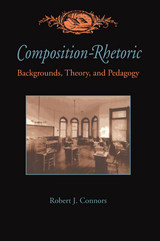

Connors provides a history of composition and its pedagogical approaches to form, genre, and correctness. He shows where many of the today’s practices and assumptions about writing come from, and he translates what our techniques and theories of teaching have said over time about our attitudes toward students, language and life.
Connors locates the beginning of a new rhetorical tradition in the mid-nineteenth century, and from there, he discusses the theoretical and pedagogical innovations of the last two centuries as the result of historical forces, social needs, and cultural shifts.
This important book proves that American composition-rhetoric is a genuine, rhetorical tradition with its own evolving theria and praxis. As such it is an essential reference for all teachers of English and students of American education.
READERS
Browse our collection.
PUBLISHERS
See BiblioVault's publisher services.
STUDENT SERVICES
Files for college accessibility offices.
UChicago Accessibility Resources
home | accessibility | search | about | contact us
BiblioVault ® 2001 - 2024
The University of Chicago Press









